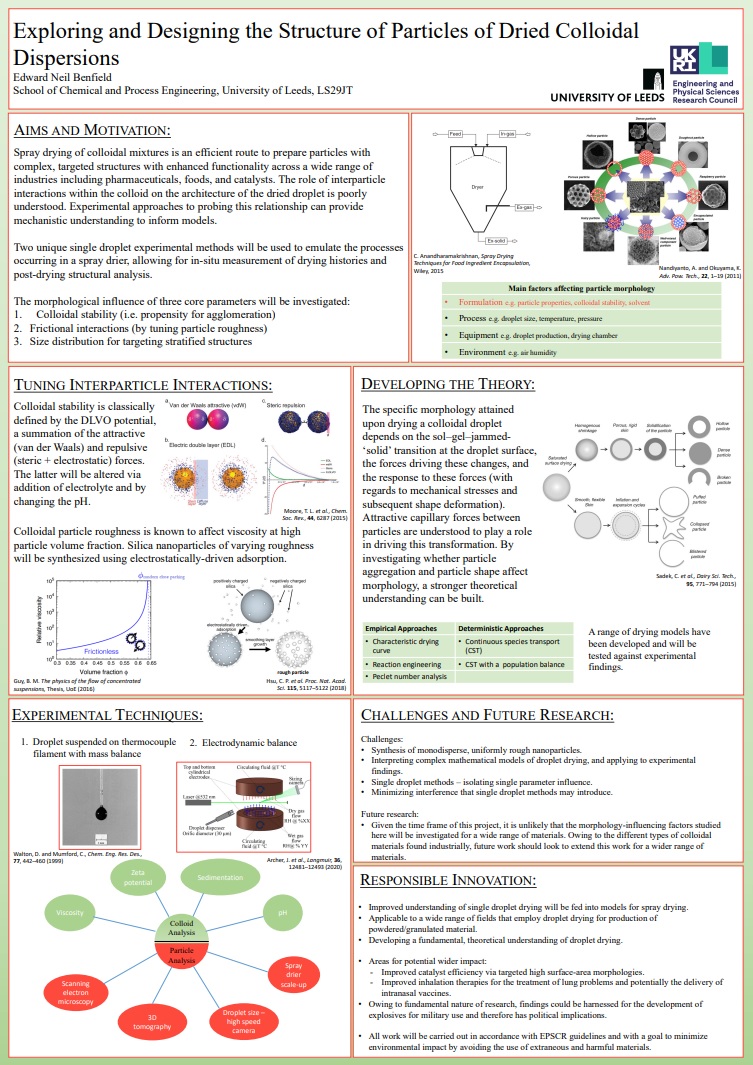Materials & Aerosol
Aerosol routes to materials are common including through processes such as spray drying, aerosol flow reactors, aerosol assisted chemical vapour deposition (AACVD) and aerosol jet printing. CDT projects are developing a new packed bed reactor for carbon nanotube synthesis, developing new inorganic materials through AACVD, developing new inks for p- and n-type semiconductor materials as routes to printed electronics, exploring new soft-material aerosols, and developing models to understand particle formation and morphology formation in spray driers.
Aerosol-Based Flavour Encapsulation for Grass-Based Food Alternatives
Transform the UK’s food scene by unlocking the vast potential of grass, which blankets 70% of agricultural land. Join the forefront of innovation at the University of Bath, contributing to groundbreaking nutrient extraction from grass. In this project, your integral role involves pioneering flavour encapsulation techniques using cutting-edge methods like spray drying and electrospray drying. The focus is on surmounting challenges in nutrient stability and taste masking. With grass-based alternatives pivotal for sustainability, join us on an exhilarating journey to reshape plant-based nutrition, optimize grass utilization, and unveil a new era of eco-conscious, nutrient-rich food alternatives—all driven by aerosol science.
PhD student: Fengjiao Zheng
Cohort: 6
Lead supervisor: Dr Bernardo Castro Dominguez, Dr Hannah Leese and Prof. Chris Chuck
Institution: University of Bath
Field Effected Aerosol Assisted Chemical Vapour Deposition (FE-AACVD) of Thin Film Materials
Aerosol assisted CVD is a manufacturing processes that involves depositing thin films of inorganic materials to improve the optical, electrical, or mechanical properties of a component. This work will investigate the effect of electrical and/or magnetic on thin films such that optical, semiconducting, and physical properties may be fine-tuned for any number of applications.
PhD student: Joshua Buckingham
Cohort: 4
Lead supervisor: Dr Andrew Johnson
Institution: University of Bath
Responsive Aerosol: A Design Framework for Aerosol with Required Properties
The broad objective of the PhD is to develop a framework for assessing the extent to which the responsive properties of aerosols can be designed and stimulated by changes in their environment. We will examine the potential of aerosols formed from gels and amorphous phases to provide dynamic response to environmental stimuli.
PhD student: Sorrel Haughton
Cohort: 4
Lead supervisors: Prof Jonathan Reid & Prof Wuge Briscoe
Institution: University of Bristol
Mechanics of soft aerosols
Many biological and synthetic aerosols are composed of soft materials that behave somewhere between fluids and solids, including viscous droplets of mucus proteins and lipids that transmit COVID19. In this project, you will explore the soft-matter science behind aerosol suspensions by modelling how surface tension and viscoelasticity affect droplet production and adhesion. The outcomes could be relevant to the science of masks and droplet spreading.
PhD student: Jamie Mclauchlan
Cohort: 3
Lead supervisor: Dr Anton Souslov
Institution: University of Bath
Controlling the Morphology and Phase of Dried Aerosol Particles
This project focuses on the drying of aerosol droplets to form particles of complex morphology, phase and microstructure. Of relevance to a broad range of areas from atmospheric aerosols to disease transmission to formulation science, you will use innovative laboratory tools and models to investigate the drying kinetics and phase change of aerosols.
PhD student: Barnaby Miles
Cohort: 3
Lead supervisors: Prof Jonathan Reid and Dr Rachael Miles
Institution: University of Bristol
This project is an industry funded studentship supported by Future Formulation programme.
Exploring and designing the structure of particles of dried colloidal dispersions
The drying of droplets of colloidal dispersions is common to many systems and a rich variety of particle morphologies and structures are formed. This project will explore, using experiments interpreted by models, the mechanisms governing structure formation. Through this knowledge new particles will be designed and engineered.
PhD student: Edward Benfield
Cohort: 3
Lead supervisor: Prof. Andrew E. Bayly
Institution: University of Leeds
This project is an industry funded studentship supported by Future Formulation programme.
Aerosol Jet Printed p- and n-type semiconductor Materials: Practical Routes to Printed Electronics
This studentship focuses on the development of new inorganic inks for the aerosol jet printing of p- and n-type semiconductor electronics. The project will involve the synthesis and characterisation of new nanoscale metal-oxide and metal-chalcogenide molecules for the formulation of new composite inorganic inks. The projects sits at the interface between molecular/materials chemistry and aerosol science, and is ideally suited for students with an interest in both inorganic and materials chemistry.
PhD student: Ellie Vokes
Cohort: 2
Supervisor: Dr Andrew L Johnson
Institution: University of Bath
Aerosol-assisted chemical vapour deposition (AACVD) of inorganic functional materials
This project will use aerosol assisted chemical vapour deposition (AA-CVD) to develop inorganic and hybrid semiconducting materials e.g. SnS, Sb2S3 and FeS2 by the in-situ decomposition of soluble molecular precursors. The project offers a combination of chemical synthesis and aerosol/materials characterisation.
PhD student: Ted Robson
Cohort: 1
Supervisors: Dr Andrew Johnson (Bath) and Dr Adam Boies (Cambridge)
Institution: University of Bath
Development of a packed bed reactor for carbon nanotube synthesis
This proposal will address the issue of understanding the concentration of all species at which aerogel forms. The methods to analyse the distribution of nanoparticles within the reactor both axially and radially will be performed via aerosol collection techniques. Once the fundamental reaction kinetics and concentrations of the chemically relevant species are both known and understood, the reaction will be put into a higher reaction density reactor. The data from this study will be used for modelling aerosol dynamics within the reactor and coupled with computational fluid dynamics model.
PhD student: Michael Glerum
Cohort: 1
Supervisors: Dr Adam Boies (Cambridge)
Institution: University of Cambridge
This project is an industry funded studentship supported by Q-Flo Limited.
![]()

EPSRC CDT in Aerosol Science
University of Bristol
School of Chemistry
Cantock’s Close
Bristol, BS8 1TS
aerosol-science@bristol.ac.uk
Partner Newsletter
Sign up to receive monthly news and updates from the CDT in Aerosol Science, as well as events, training and research webinars.



